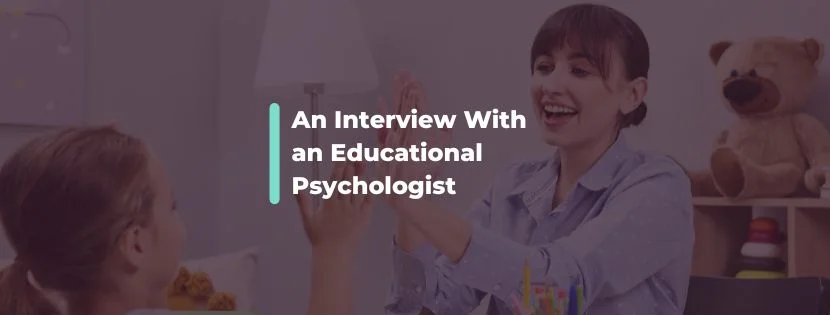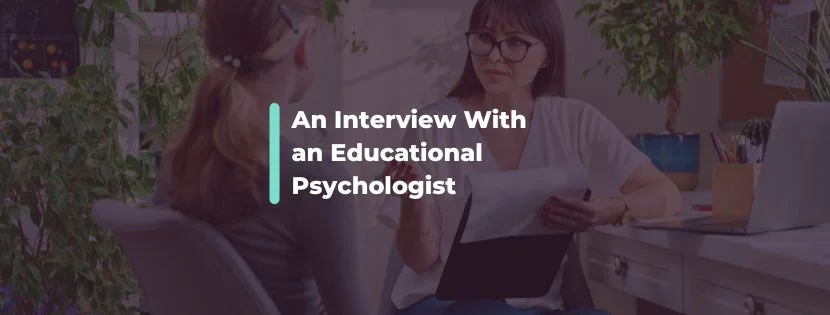From Teacher to Educational Psychologist: A Journey in Education and Inclusion
31 Oct, 20251-2 minutes
In this blog, you will learn:
- About the journey from Teacher to a Specialist Educational Psychologist.
- About the differences in inclusive education approaches between Northern Ireland and England and what these reveal about supporting every learner.
- About this Educational Psychologists evidence-based framework to help schools nurture belonging and balance across communities.
- How to find and apply for the best Educational Psychologist jobs.
The path from Teacher to Educational Psychologist isn’t particularly common, but for Ali, it was a natural next step.
For nearly 25 years, Ali has dedicated her career to supporting children and young people across England and Northern Ireland, first as a Teacher and then as a Specialist Educational Psychologist. Her work has always centred on inclusion, belonging and helping those with SEND thrive in education.
As a caregiver, mother and educator, Ali’s personal experiences have shaped her choices and made her passionate about doing more for children and young people.
Throughout this interview, Ali shares how her relationships, experiences and personal challenges have shaped her approach and reveals what she finds most rewarding about being an Educational Psychologist.
Tell us about your teaching career
Since my teenage years, I have engaged with children and young people. I started with some voluntary and then paid work teaching sports in London, which opened the door to other opportunities with children during my A-levels and undergraduate years.
I had no idea what I wanted to do with my life back then, but I suppose it was almost inevitable that I would continue working with children and young people in one way or another.
My dad lived with Multiple Sclerosis (MS) and was wheelchair-bound by the time I started secondary school. As a young carer, I witnessed how physical disability excluded my dad from many important aspects of life and society.
I chose to study neuroscience because I wanted to help find a cure for MS, however, as I progressed through my degree, I found myself increasingly interested in psychology. I tutored students in psychology while at university and discovered that I loved helping others learn. After graduating, it felt natural to train as a Teacher.
After completing my Postgraduate Certificate in Education (PGCE), I moved to Northern Ireland and taught there for the next four years. I was fortunate to secure a teaching position at an ‘integrated’ secondary school that brought together students from diverse backgrounds, religions and communities.
At the time, I took the highly inclusive nature of the school for granted, but I now fully appreciate its importance. The more I learn about what works in inclusive practice now, the more I realise we were already using most of these strategies more than 20 years ago.
What inspired your journey from teaching children to becoming an Educational Psychologist?
Less than two years into my teaching career, I faced a personal tragedy that prompted me to reconsider my career path. I decided that I wanted to build upon my interest in psychology and as a Teacher, educational psychology seemed like the natural choice.
At the time, I didn’t know much about educational psychology and concluded that becoming an Educational Psychologist could be a way to support young people who were hurting or struggling before they reached the point of crisis.
It was only years later that it occurred to me that I could do so much more for these young people by truly getting to know them and building relationships as a Teacher or school staff member.
After qualifying as an Educational Psychologist, I briefly worked for the NHS as an Autism Home Intervention Therapist. I then worked as an Educational Psychologist for the EANI (Education Authority across Northern Ireland) for 13 years before I took on a new Educational Psychologist role with a local authority in the southeast of England. Five years into this role, I took on a specialist Educational Psychologist role to support inclusion and belonging within my local authority.
What qualifications and experiences have contributed to your role in educational psychology?
Back then, the path to become an Educational Psychologist was quite different from today’s doctorate route. Like today, you needed a degree in psychology accredited by the British Psychological Society.
However, back then you also needed to have a teaching qualification and at least two years of teaching experience before earning an accredited MSc in educational psychology. I obtained my undergraduate psychology accreditation through a part-time, distance-learning conversion course while working full-time as a Teacher.
Although the job title and the qualifications for an Educational Psychologist in England and Northern Ireland are the same, both the job itself and the school system quickly proved to be profoundly different. I had to quickly develop some new skills; however, the biggest shock was the approach to inclusion and behaviour management in many of the schools I encountered.
In Northern Ireland back then, isolation was illegal, suspension was considered a last resort, permanent exclusion was very rare, and part-time timetables were reserved only for those pupils requiring regular hospital treatment.
All Northern Irish special schools were state-funded and specialist places were very limited. It was simply expected that the mainstream schools would support all of their pupils, regardless of type or level of need, within a full-time placement. Until I moved back to England, it never occurred to me that things could be so different elsewhere in the UK.
What do you find most fulfilling about your role?
I like to practise positive psychology as much as possible. Positive psychological approaches aim to identify and build upon strengths, resources and things that are going well, essentially to make the hard things a little bit easier.
This type of work is collaborative, person-centred and solution-focused. It is an approach that I use when working with children, adults, individuals, groups and whole schools, as well as for multi-agency work.
In my experience, most people come away from these types of experiences feeling better than when they arrived. Helping someone recognise the best qualities in themselves or their children and encouraging them to build on those strengths is quite special.
I am most proud of developing the BASE (Belonging and relationships, Autonomy, Sense of safety and Equity) Model of Inclusion. This evidence-based framework helps schools improve inclusion by providing a simple, visual guide based on the metaphor of a balanced ecosystem, where all parts of the school community need to be nurtured and in balance for all parts to flourish.
In that way, the school provides an inclusive ‘base’ for all members of the school community. The model was developed through collaborative work with a range of colleagues, education professionals, pupils, parents/carers and school staff. It was designed to create a simple and user-friendly framework for inclusion, one that can be used in a bespoke way by any school according to its specific requirements at any given time.
I think I have achieved these aims with the BASE Model. Since its launch in June 2024, early feedback has been very positive and it is now being increasingly widely used within my local authority and beyond.
Can you describe a time where you faced a challenging situation in your career and how you resolved it?
The key challenge for me has been around the statutory systems for SEND support, currently the EHCP system in England. I fully acknowledge that an EHCP can, for some, make a huge difference. It can turn lives around and perhaps even save lives.
However, EHCPs don’t magically make everything better. They are simply documents with recommendations and funding and their impact depends on quality and implementation.
Sadly, I believe that the process of going through the EHCP system is, for too many young people, families and schools, causing more harm than good. By its very nature, it is exceptionally difficult to write an Education, Health and Care Needs Assessment (EHCNA) report and an EHCP that promotes inclusive practice.
Instead, they often inadvertently lead to ‘othering’ and segregation of children and young people identified with additional needs. And yet, within the system we currently have, they are, for many, the only option available. For me, this presents a moral and ethical dilemma that has permeated throughout my career.
When asked to complete an EHCNA, I aim to do my best for the individual child within their specific context. I have to accept that I cannot change the system, but I can perhaps help to bring about positive change for one child, one family at a time.
I also aim to promote genuinely inclusive practice and support preventative work as much as possible. If I can facilitate personalised and inclusive support in a way that means even one more child can flourish at school without needing to go through the EHCP process, that, to me, is a win.
Looking back, what turning points in your career most shaped your approach to educational psychology?
In general, there has been more of an evolution in my approach than a turning point. When I find something that has made people’s lives better in some way, I reflect on what helped achieve that and I try to learn more about how I can use it more in the future.
As well as being a fan of positive psychology, I love to work collaboratively with people to jointly produce an action plan or way forward that is specific to their needs at that moment. If someone leaves a meeting or assessment feeling even slightly better or more hopeful than when they came in, that’s a great first step.
It’s amazing if that can be replicated over and over again! That’s what I strive to do, whether working with children and young people, school staff, parents/carers, other professionals, or anyone else with an interest in improving young people’s lives.
If I had to choose a single turning point, it would be the move back to England. For the first few years after the move, I had greater autonomy to broaden, diversify and shape my practice. I’ve met so many inspiring colleagues since returning and they have all played a part in shaping the way I work. Moving back here provided the opportunity to become a better Psychologist and for that, I will always be grateful.
What has been the most surprising aspect of your career as an Educational Psychologist?
The most surprising thing to me is that educational psychology turned out to be a great fit for my personal strengths, interests and values, even though I had little knowledge of the role when I started training all those years ago.
Initially, I hoped to support children and young people who were having a difficult time at school. I soon discovered the profession also allows me to advocate for social justice, equity and inclusion, as well as contribute to wider systemic change.
By becoming an Educational Psychologist, I found a strong sense of belonging in a field that I feel both proud and fortunate to be part of.
What new knowledge or skills do you think Educational Psychologists entering the field now will need most?
Educational Psychologists come from a range of backgrounds and bring with them equally diverse knowledge and skill sets.
Core skills used across educational psychology practice, include:
- Being non-judgemental and showing genuine positive regard in all professional relationships.
- Looking beyond diagnoses or labels to consider broader underlying factors.
- Having a love of learning! The best Educational Psychologists are constantly reflecting on and seeking to improve their own practice.
- Great communication skills. You need to be able to communicate in a multitude of ways and adapt your communication for a wide variety of audiences.
- Excellent writing skills. You need to be prepared to do a lot of written work. It really helps if you enjoy writing, as you will spend a large amount of time in front of a computer screen.
- Continuously caring about children and young people, their parents/carers, school staff and the system in general. You will be working with people across the whole system and you need to maintain empathy and commitment, even at the most challenging times.
Educational Psychologist jobs
If you’re searching for your next Educational Psychologist job, why not take a look at the latest vacancies, or simply upload your CV to be notified when a relevant position becomes available.
Struggling to recruit Educational Psychologists?
As specialist local authority SEND recruiters, we support local authorities nationwide with their temporary, interim and permanent staffing needs.
If you’re struggling to recruit, we have exclusive access to some of the most experienced interim Educational Psychologists in the UK.
Simply contact Natalie Boaler on 01772 954200 to discover how we can help.
Share your experience
Every individual brings a unique set of experiences, thoughts, and insights to the table. We believe in giving a voice to a community of professionals to inspire positive change and champion reform in the healthcare sector.
If you work in the healthcare sector and would like to share your own personal and professional experiences, we’d love to hear from you. Perhaps you have a different perspective, could offer a fresh angle, or want to challenge assumptions.
Simply reach out to our Head of Content, Nicole Sherwood, to discuss a collaboration which makes your voice count.
Who is Spencer Clarke Group?
Established in 2017, we’re an award winning and progressive recruitment agency based in the heart of the North West. Our reputation is built on trust, expertise and an unwavering commitment to exceed expectations.
In 2025, Spencer Clarke Group was awarded Best Public/Third Sector Recruitment Agency and Best Temporary Recruitment Agency at the Recruiter Awards. In 2024, Spencer Clarke Group was also named Recruitment Agency of the Year.




